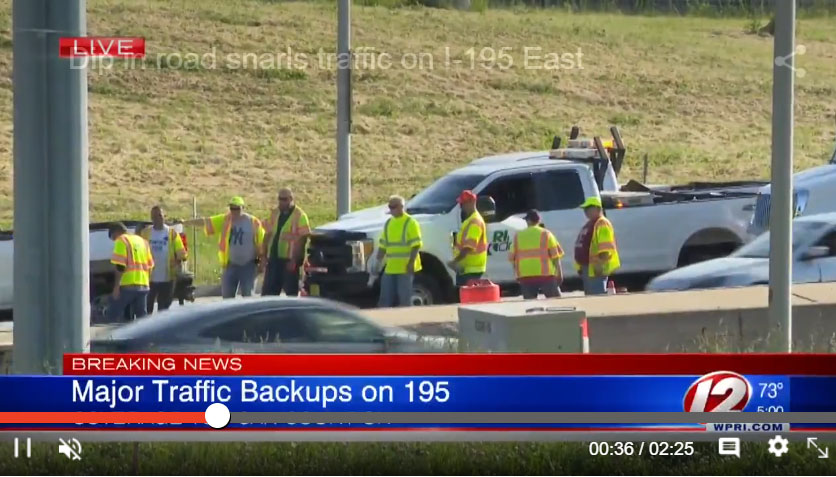Sinkholes of One Kind and Another
Readers in the Rhode Island area, particularly to the east of Providence, may have caught wind of the heavy traffic along I-195, yesterday. Apparently, crews were repairing some sort of “depression” in the road, perhaps from a prior patch. These things happen, of course, but the longer a fix takes, the more traffic it causes, and the more expensive it is to do road work and maintenance, the less state and local governments will be able to do.
With regard to that second point, this still from WPRI’s coverage arguably tells the deeper story:
To be fair, the reporter does say that the video was being taken as the crew was doing “finishing touches,” so at earlier periods the ratio of people working to standing around might not have been two to eight, as appears to be the case in this short clip. That said, seeing high proportions of watchers to workers is hardly an unusual experience in Rhode Island.
One suspects a large part of the calculation is the strict assignment of jobs. In traffic, recently, I watched a crew setting curbs along an exit ramp. Two guys were hanging out in the truck with all of the traffic cones, another appeared to be supervising, two guys were in the hole setting curbs, another was standing on a truck to offload the curb pieces a few feet away, and another was driving the machine back and forth to move the curbs. (Plus the cop directing traffic, of course.)
[box type=”note” style=”rounded”]To Our Readers: We need your support to challenge the progressive mainstream media narrative. Your donation helps us deliver the truth to Rhode Islanders. Please give now.[/box]
That crew could easily have been cut nearly in half without a loss in efficiency or safety simply by putting the cone placers to work setting curbs and giving the supervisor a more-active task. I never did road work when I was in construction, but similar tasks would probably have called for only three people: One helping to set the curbs, one operating the machine, and one going back and forth to hook the machine to each new curb piece.
Multiply that excessive labor cost times every task associated with every yard of roadway, and the potential savings that could be put toward accelerated repairs and maintenance or left in the private economy would be massive. Eliminating any presumed need for truck tolls would just be the starting point.



